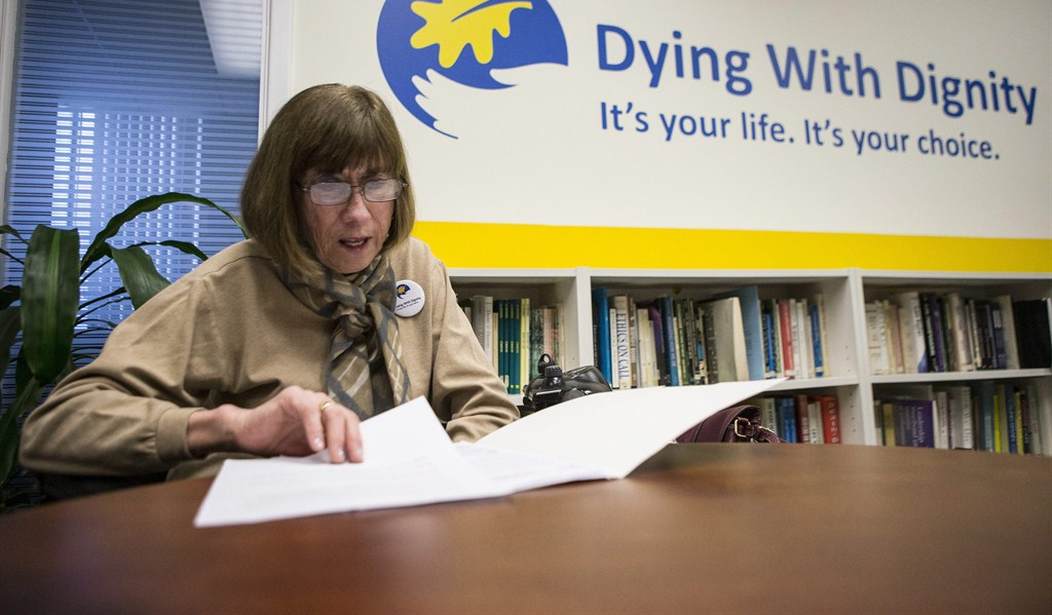It's a depressing prospect. Great Britain is looking to legalize assisted suicide and appears to be blindly walking into disaster.
Advocates are claiming that the bill is "a win for decency and dignity—while offering robust safeguards to avoid the mistakes of other countries," according to Persuasion's Matt Johnson.
We've heard this song before. "The End of Life Bill is highly restrictive," writes Johnson. So were other assisted suicide bills in the Netherlands, Belgium, and Canada.
Beyond the baseline conditions—that applicants are adults of sound mind who have not been coerced or pressured in any way, and who have a “clear, settled and informed wish to end their own life”—the bill contains many robust safeguards. For example, a person must be terminally ill to be eligible for lawful assistance in their death. This means they must have an “inevitably progressive illness, disease or medical condition which cannot be reversed by treatment,” and their death can “reasonably be expected within 6 months.”
A 23-year-old woman in Belgium, Shanti De Corte, who survived an ISIS terrorist attack at the Brussels airport in 2016 suffered from "depression" for years and was granted her request to be "euthanized."
She was in and out of mental health facilities for years. What she suffered from most was the incompetence of the mental health employees who were giving the victim 11 anti-depressants a day.
"With all the medications I take, I feel like a ghost that can’t feel anything anymore. Maybe there were other solutions than medications." In the end, the system failed her and just gave up on her.
"Robust safeguards?" Phooey!
Canada also started with "robust safeguards" with their Medical Assistance in Dying (MAID) program. That was in 2016. A patient had to be terminally ill to access the MAID program.
Now, Canada will allow the mentally ill to access MAID. The case of Lisa Pauli, a 47-year-old woman suffering from the eating disorder anorexia is instructive. She wanted to kill herself because nothing she tried was helping her condition. She was suffering and she wanted to end her life.
Should the state give up on her and send her on her way because the system is overtaxed and overextended? A Canadian military veteran, Kelsi Sheren, said it was easier to access end-of-life care than social services.
Fix the damn system instead of killing people that can be helped.
Johnson dismisses these concerns out of hand.
There have been plenty of bad faith arguments against the End of Life Bill, such as the idea that non-life-threatening conditions like diabetes could fall under the criterion “cannot be reversed by treatment”—ignoring the bill’s stipulation that these conditions must be imminently terminal—or the ugly and false argument that the bill treats some people as “productive” and others as “disposable.” But most critics of the bill raise important points that will need to be a central focus as the legislation works its way toward becoming law (although many have been addressed already).
Antwerp prosecutors investigated the death of De Corte after receiving "complaints from a doctor at the UZC Brugman academic clinical hospital in Brussels. He said the decision to euthanize Shanti 'was made prematurely.'”
Gee. Ya think?
The Federal Commission for the Control and Evaluation of Euthanasia in Belgium didn’t see any problems with the case. I guess the "robust safeguards" must have been misplaced.
In 2004, I wrote about the Groningen Protocols in the Netherlands that allowed doctors to take the decision of life or death of a newborn out of the hands of parents and leave it to a committee.
In William L. Schirer’s classic “The Rise and Fall of the Third Reich,” the author points out that while Nazis encouraged “Aryan” women to have as many babies as possible, (even out of wedlock) non-Aryans such as Jews, gypsies, Slavs, and others were the victims of forced abortions and sterilization. It was but a short jump from those policies to the euthanasia practiced against the deformed, the retarded, and all who, in the opinion of the doctor, would be a burden on the Reich.
The Groningen Protocols eerily echo these policies and call into question the very nature of man’s relationship to government in a free society. When the most important right of all–the right to life–is put in the hands of a committee, it’s time for the Dutch people and indeed the entire euthanasia movement to rethink and reevaluate what they’re trying to accomplish.
It didn't happen. And it wasn't a "slippery slope" that transpired. It was a greased chute. Mentally unstable people are now able to end their lives. The "robust safeguards" are, I'm sure, an earnest attempt to do the right thing. But what happens when those "safeguards" play second fiddle to the "right" to end your own life?
Last year, when Canada changed its MAID program to allow the mentally ill to be eligible, I wrote, "What should be clear to even the most casual observer is that there is no 'middle ground' with euthanasia advocates. This is exactly the reason we should be terrified of these people. Their goal is not 'compassion' but victory. Outside moral judgments must not play a role in 'individual autonomy.'"
Making state-sanctioned suicide anything more than a rare, reluctantly taken medical intervention is barbaric. Canada, the UK, and other Western nations should wake up before they start building suicide centers à la Soylent Green.










